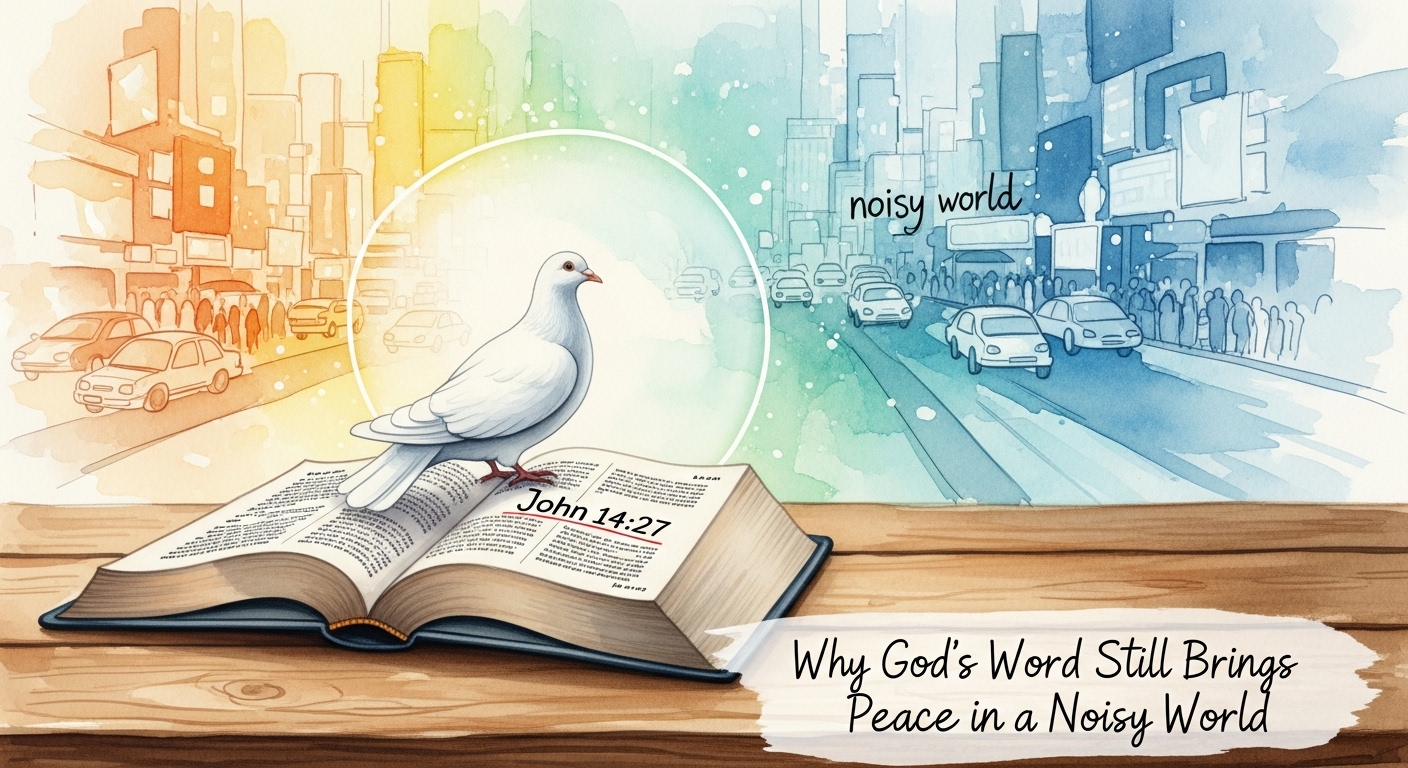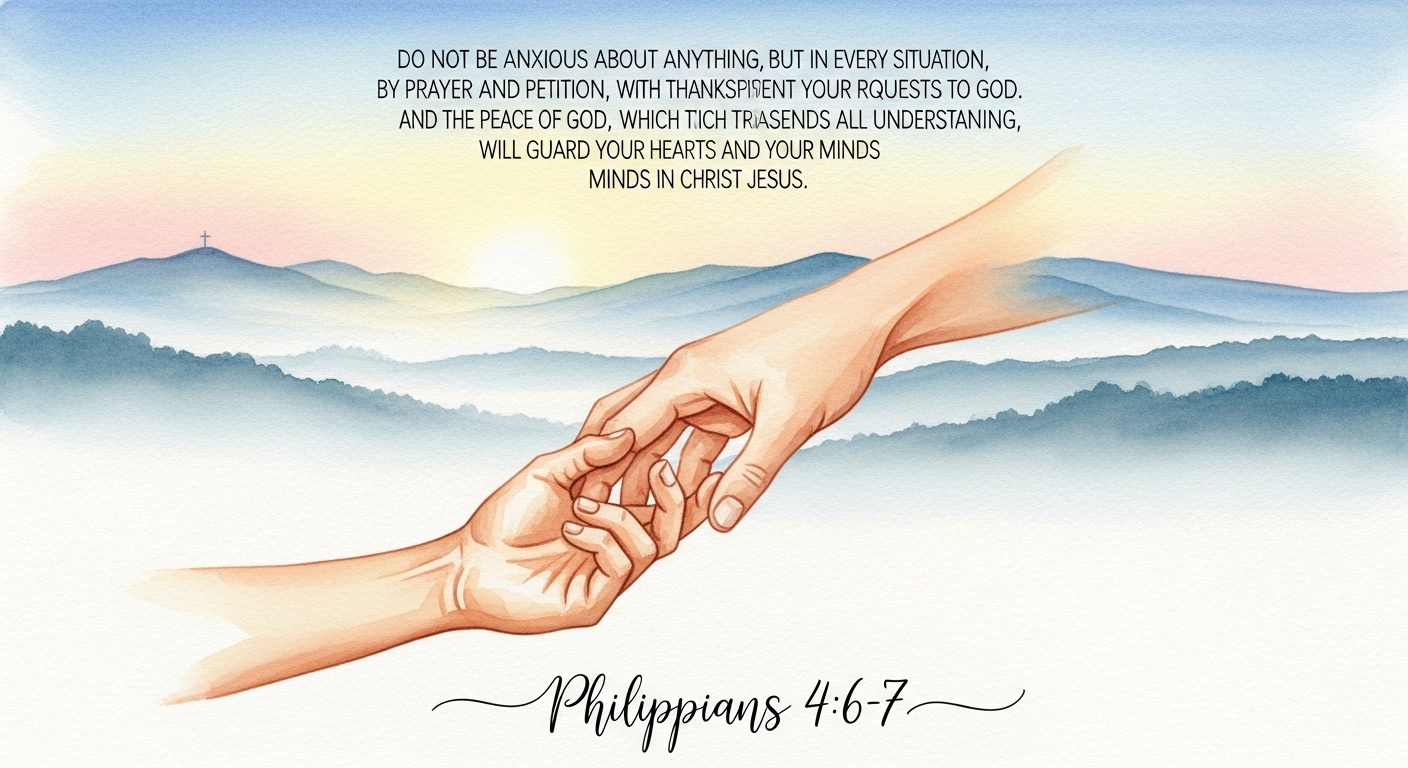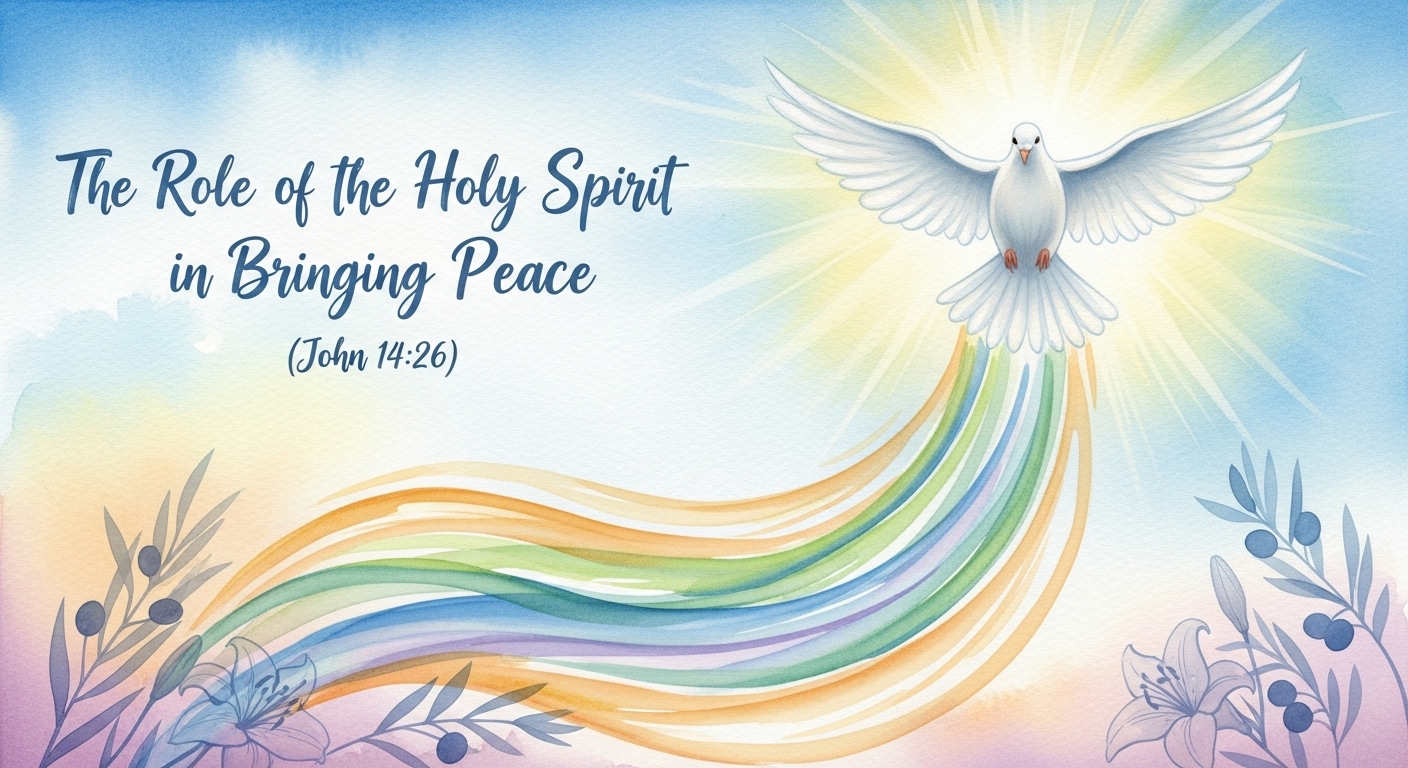Why God’s Word Still Brings Peace In A Noisy World
You live in a world that never shuts up. Notifications buzz, headlines scream, schedules cram, and opinions collide. In the middle of that noise, you may find yourself longing for a quiet center, a steadiness that isn’t dependent on Wi‑Fi or someone else’s approval. That is where peace through God’s Word becomes a real, practical option for you. The Bible doesn’t promise a life free from storms, but it does promise a presence and peace distinct from anything the world can offer: “Peace I leave with you; my peace I give you” John 14:27. This article walks you through why Scripture still brings peace in a noisy age and how you can access that peace in daily life.
The New Noise: Why You Feel Tired and Scattered
You’re surrounded by a kind of noise that previous generations didn’t face: constant updates, curated realities, and an expectation to respond immediately. That constant sensory input trains your brain to be reactive, not reflective. Scrolling fills time, but often empties you. In that environment, peace through God’s Word starts to look not like a luxury, but like a necessary correction. Scripture invites a slower rhythm: reading, reflecting, and letting truth take deeper root. It doesn’t require bandwidth or an algorithm to prioritize it, only your willingness to stop and listen. When you intentionally place the Word before the world’s noise, you begin to trade frantic reaction for steady presence.
Why the Bible Speaks to a Restless Heart
The Scriptures were written for people who wrestled with fear, insecurity, and change—just like you. Through promises, stories, commands, and comfort, God’s Word addresses the deep things of your heart. Consider the promise of peace: “Do not let your hearts be troubled and do not be afraid” John 14:27.

That command was given to people who had every reason to be troubled, yet it points you to a peace that’s neither circumstantial nor sentimental. The Bible’s messages are rooted in a relationship with God rather than a system of techniques. That relational foundation is what makes peace through God’s Word durable and not simply a temporary feeling.
What Scripture Actually Calls “Peace”
Peace in the Bible is more than the absence of conflict; it’s shalom—wholeness, flourishing, right relationship with God and others. You can see that in how the New Testament speaks of the peace of God, which “transcends all understanding” and guards your heart and mind Philippians 4:6-7. This peace doesn’t remove challenges; it steadies you amid them. Isaiah describes a kind of peace that comes from trusting God’s faithfulness: “You will keep in perfect peace those whose minds are steadfast, because they trust in you” Isaiah 26:3. When you align your mind and trust with God, Scripture teaches that peace follows—not as a reward for perfect performance but as the fruit of a reoriented heart.
How God’s Word Reorients Your Mind?
The world fills your mind with competing narratives—fear, scarcity, comparison—but the Bible offers a different narrative grounded in God’s character. Paul tells you to be transformed by the renewing of your mind, which changes how you discern God’s will (and how you feel) Romans 12:2.

Reading, meditating, and memorizing Scripture reprograms the flow of your thoughts from anxious to anchored. When you let Scripture dwell in you richly, the patterns of worry start to give way to trust. That doesn’t happen instantly; it’s a daily repetition. But over time, God’s promises become the default responses your heart leans on, and peace through God’s Word becomes a lived reality.
The Word as a Practical Tool: How Scripture Works in Your Brain and Soul
Scripture is not only spiritually true but psychologically helpful. Memorizing verses gives you a quick resource when anxiety hits. Meditating on a promise slows down your racing mind. Worship and Scripture together shift your emotional set point. Hebrews describes God’s Word as living and active, able to judge the thoughts and attitudes of the heart Hebrews 4:12. That’s not mystical jargon; it’s an invitation to let a better truth test and correct the lies that threaten your peace. Reading Psalm 119:105, you see the Word as a lamp and light for your path—an ongoing guide when confusion surrounds you Psalm 119:105. When you pair Scripture with prayer, the decisions, fears, and daily rhythms of life become less overwhelming because you’re inviting God’s wisdom to steer you.
Biblical Examples: Peace in the Midst of Storms
You’re not the first person to face overwhelming noise. The Bible contains stories of people who found steadiness in God amid chaos. Jesus literally calmed a storm with a word: “Quiet! Be still!” Mark 4:39. That incident shows that God’s power and presence issue peace even when external circumstances are terrifying. King David, who wrote many psalms from places of fear and fugitive living, modeled reliance on God’s presence: “The Lord is my shepherd; I shall not want” Psalm 23:1. The apostle Paul learned contentment in every situation and credited God for the peace that sustained him Philippians 4:11-13. These examples show that peace through God’s Word is not naïve optimism but profound resilience rooted in God.
Promises That Anchor You When the World Rocks Your Boat
Scripture over and over gives you promises to anchor your heart: God’s presence, His steadfast love, His provision. You can rely on promises like “I will never leave you nor forsake you” Hebrews 13:5 and “Do not be afraid, for I am with you” Isaiah 41:10. These aren’t platitudes; they’re covenantal assurances meant to shift your sense of security from fragile things to the unshakeable God. Deuteronomy reassures God’s people that they can be strong and courageous because God goes with them Deuteronomy 31:6. When you read and believe these promises, your heart begins to anchor itself in what God says rather than how things feel.
The Discipline of Daily Engagement With Scripture
You don’t get peace through God’s Word by accident. It comes through daily engagement—reading, reflecting, and applying. The Bible’s wisdom encourages steady, habitual engagement: “Blessed is the one…whose delight is in the law of the Lord, and who meditates on his law day and night” Psalm 1:2-3. Joshua encourages meditation on Scripture as a way to prosper and be careful in your ways Joshua 1:8. That sounds like discipline, but it’s also an invitation to reorder your life around what truly matters. When you make Scripture part of your daily routine—before emails, between meetings, or at bedtime—you create predictable pathways for peace to enter your day.

Practical Ways to Seek Peace Through God’s Word Every Day
You probably want concrete habits you can implement. Here are approachable practices that fit into a busy life and help you experience peace through God’s Word:
- Start small: read one verse or a short psalm and sit with it for five minutes. Meditation matters more than quantity.
- Memorize a promise to carry you through anxiety—Philippians 4:6-7 is a good place to begin Philippians 4:6-7.
- Use Scripture as your prayer: speak God’s words back to Him, and bring your fears under those promises.
- Create a listening habit: audio Bibles and Scripture podcasts are great when your hands are full, but your mind can listen.
- Practice Lectio Divina: read, meditate, pray, and contemplate a single short passage slowly and expectantly.
These habits aren’t magic formulas; they are ways to invite God’s truth to shape your heart and mind so that peace through God’s Word moves from theory into lived experience.
Meditation, Memorization, and the Quiet That Follows
There’s a reason ancient spiritual practices emphasize slow reading and memorization: they change you. Memorizing Scripture gives you an internal resource to counter fear and false narratives. Psalm 119 even says storing God’s words in your heart leads to great peace Psalm 119:11. Meditation—chewing on a phrase or promise—slows your brain and lets truth sink deeper. Your culture trains you for speed; Scripture trains you for rootedness. When you meditate on verses like Isaiah 26:3, you practice the discipline of aligning your mind with God’s peace Isaiah 26:3.
Battling Doubt and Skepticism With the Word
You may come to Scripture with doubts. Maybe you’ve been hurt, pushed away, or simply wearied by religion. The good news is that peace through God’s Word doesn’t require you to start as a perfect believer; it invites honest wrestlers. The Bible models doubt—Thomas, for example, asked real questions—and Jesus still engaged him. You can bring your questions to the text and to God. Practical steps: read passages that address faith and doubt directly, like the Psalms of lament; journal your honest reactions; ask God for wisdom, as James encourages James 1:5. The Word is not an enemy to your questions; it’s the place where God speaks into them.
How to Create Digital Habits That Protect Peace
Because you live in the digital age, you need digital guardrails. Unfiltered noise will chip away at any hard-won peace if you let it. Create boundaries: schedule a digital Sabbath, turn off nonessential notifications, and curate feeds that build you up rather than tear you down. Use tech to help—set Scripture notifications, download an audio Bible for commutes, and use reading plans from reputable sources like Bible Gateway to guide you. When your technology becomes a tool for Scripture rather than a distraction from it, you increase your chances of experiencing sustained peace through God’s Word. Remember, tools are neutral; it’s how you use them that matters.
Community, Worship, and the Word: Peace Isn’t Just Private
You might think peace through God’s Word is a solitary pursuit, but community amplifies the work of Scripture. Shared reading, communal prayer, and worship help you internalize truths and bear burdens. The early church modeled this when believers met regularly to read, teach, and pray together. Sharing Scripture with others allows you to see how the Word speaks into different struggles and seasons, reminding you that you’re not alone. Corporate worship places truth in a communal setting and reinforces promises with song and proclamation. When you combine private engagement with public faith, Scripture’s peace becomes both personal and shared.

The Role of the Holy Spirit in Bringing Peace
You don’t rely on Scripture alone; the Holy Spirit works through the Word to bring peace. Jesus promised the Spirit would teach and remind you of Jesus’ words John 14:26. The Spirit helps translate the truths of Scripture into your lived reality, convicting, comforting, and guiding. Romans frames peace as a fruit of the Spirit’s work—where your mind is set on the Spirit, there is life and peace Romans 8:6. When you read the Bible in dependence on the Spirit, the text becomes more than words on a page; it becomes a living encounter that grounds, calms, and reorients your heart.
When Life Is Unfair: Suffering and the Peace of God
You may be struggling with seasons that feel deeply unfair—loss, illness, broken relationships. Scripture doesn’t offer simplistic answers, but it does offer a presence and perspective that can support you in suffering. Paul wrote about learning contentment in all circumstances and resting in Christ’s strength Philippians 4:11-13. The Psalms are full of honest laments that express pain and then pivot to trust in God’s character. When you bring honest grief to God’s Word, you’re not glossing over pain but opening it to a healing presence. The peace through God’s Word often looks like honest lament held by the constancy of God’s promises.
Practical Morning and Evening Routines Centered on Scripture
Routines anchor your day. Starting and ending your day with Scripture creates a rhythm that invites peace to shape you. In the morning, try a short reading, a verse to memorize, and a prayer inviting God into the day. At night, read a psalm, recount God’s faithfulness from the day, and thank Him for visible and invisible ways He worked. Small commitments repeated daily have compound effects. Joshua 1:8 links meditation with prosperity and care in one’s ways, suggesting that daily engagement really matters Joshua 1:8. Over time, these moments help you orient your decisions and emotions toward God’s steadying presence.
When You Don’t Know Where to Start: Simple Scripture Passages to Begin With
If you’re wondering where to begin, here are short passages that are approachable and rich with promises of peace:
- John 14:27 for Jesus’ promise of peace John 14:27.
- Philippians 4:6-7 for prayerful exchange of anxiety for peace Philippians 4:6-7.
- Psalm 23 for lordship and comfort in any valley Psalm 23:1-4.
- Isaiah 26:3 for a steadfast mind and trust Isaiah 26:3.
- Psalm 119:105 to guide your steps with Scripture as a lamp Psalm 119:105.
These passages are short enough to meditate on deeply and powerful enough to begin changing how you think and feel.
How Promise and Practice Intersect: Stories of Real Change
You’ll find that as you repeat small practices—memorizing a verse, praying Scripture, meditating—the promises start to reshape your habits and reactions. People often report that what used to trigger panic becomes an invitation to pray. That’s the practical outworking of peace through God’s Word: promises become pathways. The more you rehearse Scripture in your inner life, the more naturally you turn to God when crises arise, and the less you’ll be tossed by every wind of circumstance.
The Long Game: Patience, Persistence, and Growing Peace
Peace through God’s Word isn’t a one-time download; it’s a long-term cultivation. Like any deep change, it requires patience and persistence. Don’t be discouraged if you don’t feel immediate transformation. The Bible itself is full of long journeys: the people of faith walked by promises day after day. Isaiah’s promise of perfect peace for steadfast minds, Paul’s teaching on prayer and peace, and the psalms’ movement from lament to trust all reflect a process. Stay faithful to the practices, be gentle with yourself in the process, and trust that God is at work in ways you won’t always immediately perceive.

You Can Find Peace Today: A Short Action Plan
If you want a quick, practical plan to begin experiencing peace through God’s Word today, try this:
- Choose one short passage (e.g., John 14:27) and read it slowly three times, aloud if possible John 14:27.
- Spend five minutes journaling how that verse intersects your current anxieties.
- Memorize one line to repeat when you feel overwhelmed.
- Listen to an audio Bible during your commute or chores.
- Share what you read with a friend or community for accountability.
Repeat this pattern daily for a month and watch how small rhythms compound into lasting peace.
Final Encouragement: Your Peace Is Not a Commodity, It’s a Gift
You’re not being asked to manufacture peace through sheer effort. Scripture consistently points you back to a God who gives peace as a gift, who invites you into relationship, and rests you in His promises. Whether you’re grappling with fear, fatigue, or the relentless noise of the digital world, the Bible offers a steadiness that outlasts trending headlines and fleeting fixes. As Paul put it, the peace of God will guard your heart and mind when you choose prayer and thanksgiving Philippians 4:6-7. Peace through God’s Word is an invitation—not to escape life, but to live it with a God‑given calm.
Explore More
For further reading and encouragement, check out these posts:
👉 7 Bible Verses About Faith in Hard Times
👉 Job’s Faith: What We Can Learn From His Trials
👉 How To Trust God When Everything Falls Apart
👉 Why God Allows Suffering – A Biblical Perspective
👉 Faith Over Fear: How To Stand Strong In Uncertain Seasons
👉 How To Encourage Someone Struggling With Their Faith
👉 5 Prayers for Strength When You’re Feeling Weak

📘 Jesus and the Woman Caught in Adultery – Grace and Mercy Over Judgement
A powerful retelling of John 8:1-11. This book brings to life the depth of forgiveness, mercy, and God’s unwavering love.
👉 Check it now on Amazon 🛒💥
🔥 “Every great message deserves a home online.” 🌍💬🏡
Don’t let your calling stay hidden. Start a Christian blog or website using Hostinger — with 99.9% uptime, a free domain, and SSL, your voice can shine for God’s glory anytime, anywhere.
💥 Begin today. 🛒 Try it RISK-FREE! ✅
✝️ “Your body is God’s temple — care for it with purpose.” 💪💖🏛️
Renew your energy and restore balance naturally. Mitolyn helps support a healthy metabolism, giving you the vitality to live out God’s calling with strength and confidence.
🔥 Unlock Your Metabolic Power! ⚡Burn More Calories & Feel Great With Mitolyn. 💪
👉 Start Today. 🚀 Check Price Now. 🛒💰
💰 As a ClickBank & Amazon Affiliate, I earn from qualifying purchases.
📖 Acknowledgment: All Bible verses referenced in this article were accessed via Bible Gateway (or Bible Hub).
🚀 Want to explore more? 👉 Dive into our new post on Why Jesus? and experience the 🔥 life-changing truth of the Gospel!





